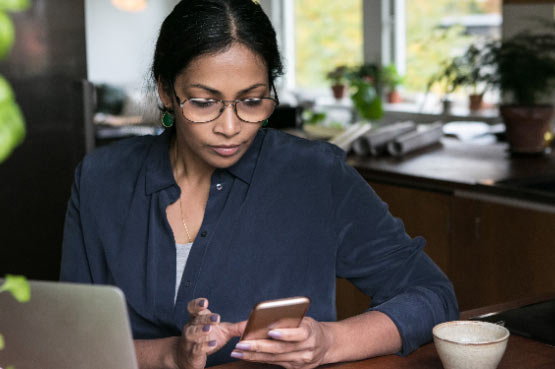How to have a healthy relationship with social media
Social media has become a part of life for many of us. It can help us share information, stay in touch with friends and access news quickly. But can it put our wellbeing at risk? And how can we protect our mental health online? Here, I provide some useful tips to help you maintain a positive relationship with social media.

Can social media be bad for our mental health?
Some studies have found that social media use can impact our mental health, particularly in young people. Research has also shown that using social media can affect how well we sleep, which can also have an impact on our mental wellbeing.
There’s also some concern about the amount of time some people spend on social media. Some studies have called this ‘social media addiction.’ This is a constant urge to check your social media accounts, so much so that it affects other areas of your life such as work, school, or relationships. It’s thought that having an intense relationship with social media can make you feel less satisfied with your life.
What are the positives of using social media?
While lots of research focuses on the negatives of social media, there’s also evidence to show it can benefit our wellbeing. Some studies looking at social networking sites like Facebook and Instagram have found that users of all ages felt an increased sense of social support.
Social media can also help us to stay in touch with friends and loved one. And it can also help us to learn new skills, and connect with other people with shared interests.
What is healthy social media use?
Healthy social media use is likely to be different for us all. For some people, regular use of social media might impact their mood. But this won’t be the case for everyone. It’s a good idea to try and find a balance that works best for you.
Try being more mindful of the content you’re viewing, and the time you’re spending on social media. It’s also important to remember that you have a choice whether you engage with social media or not. And, it doesn’t have to control your life.
How can I set healthy boundaries with social media?
Here are seven ways to help you have a healthier relationship with social media.
1. Be selective of who you follow
If you’re feeling low after spending time on social media it might be time to look more closely at the accounts you’re following. Unfollow or ‘mute’ accounts that annoy or upset you, or that make you feel bad in any way.
2. Avoid comparing yourself to others
Comparing your own life to those that you see online can make you feel low. Try to remember that what we see on social media isn’t always true to life. And everyone has good and bad days, but we don’t often post our bad days online.
3. Set time limits
One of the best ways to keep your relationship with social media healthy is to limit your use. Many phones now have settings where you can ‘lock’ certain social media apps after a length of time. This can be useful for limiting your time spent scrolling and make you more aware of how much screen time you’re having.
4. Switch off
Another way to help you limit your use of social media is to turn off your notifications. It can be distracting hearing alerts arriving to your phone and can make it more difficult to have time away from a screen. Silencing these alerts can help you be more present in your life offline.
5. Give back
If you’re passionate about a cause, why not use your social media presence to promote it? This can be a great way to support charities and help give back to the community.
6. Connect with your interests
If you’ve got a hobby that you enjoy, or there’s something you’d like to learn more about, social media can be a great tool. Follow accounts you’ve got shared interests with and use social media to grow your knowledge.
7. Focus less on likes
Some people might find that the number of likes they receive on photos affects their mood. Why not try ‘hiding’ the number of likes you receive on Instagram by changing your settings. This might help to take your focus off the numbers.
Are you interested in learning more about your health? Discover more about our range of health assessments.
-
Sources Sources
- National statistics. Social Networking – Taking Part Survey 2019/20. Department for Digital, Culture, Media & Sport. Gov.uk. Published 16 September 2020
- Karim F, Oyewande AA, Abdalla LF, Chaudhry Ehsanullah R, Khan S. Social Media Use and Its Connection to Mental Health: A Systematic Review. Cureus. 2020 Jun 15;12(6):e8627. doi: 10.7759/cureus.8627
- Perez E, Donovan EK, Soto P, Sabet SM, Ravyts SG, Dzierzewski JM. Trading likes for sleepless nights: A lifespan investigation of social media and sleep. Sleep Health. 2021 Aug;7(4):474-477. doi: 10.1016/j.sleh.2021.03.004. Epub 2021 May 9
- How to cope with sleep problems. Mind. Mind.org.uk. Published May 2020. Sleep and mental health
- Cheng C, Ebrahimi OV, Luk JW. Heterogeneity of Prevalence of Social Media Addiction Across Multiple Classification Schemes: Latent Profile Analysis. J Med Internet Res. 2022 Jan 10;24(1):e27000. doi: 10.2196/27000
- Mitropoulou EM, Karagianni M, Thomadakis C. Social Media Addiction, Self-Compassion, and Psychological Well-Being: A Structural Equation Model. Alpha Psychiatry. 2022 Nov 1;23(6):298-304. doi: 10.5152/alphapsychiatry.2022.22957. PMID: 36628380; PMCID: PMC9797840
- Caba Machado V, Mcilroy D, Padilla Adamuz FM, Murphy R, Palmer-Conn S. The associations of use of social network sites with perceived social support and loneliness. Curr Psychol. 2022 Jan 27:1-14. doi: 10.1007/s12144-021-02673-9
- Healthy social media. Building positive body image on social media- . Mental Health Foundation. Mentalhealth.org.uk. Published Spring 2019
- Social media and mental health. Young minds. Youngminds.org.uk. Accessed February 2023
About our health information
At Bupa we produce a wealth of free health information for you and your family. This is because we believe that trustworthy information is essential in helping you make better decisions about your health and wellbeing.
Our information has been awarded the PIF TICK for trustworthy health information. It also follows the principles of the The Information Standard.

More mental health and wellbeing articles
Did you find our advice helpful?
We’d love to hear what you think. Our short survey takes just a few minutes to complete and helps us to keep improving our healthy lifestyle articles.
Legal disclaimer
This information was published by Bupa's Health Content Team and is based on reputable sources of medical evidence. It has been reviewed by appropriate medical or clinical professionals and deemed accurate on the date of review. Photos are only for illustrative purposes and do not reflect every presentation of a condition.
Any information about a treatment or procedure is generic, and does not necessarily describe that treatment or procedure as delivered by Bupa or its associated providers.
The information contained on this page and in any third party websites referred to on this page is not intended nor implied to be a substitute for professional medical advice nor is it intended to be for medical diagnosis or treatment. Third party websites are not owned or controlled by Bupa and any individual may be able to access and post messages on them. Bupa is not responsible for the content or availability of these third party websites. We do not accept advertising on this page.







